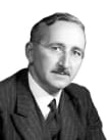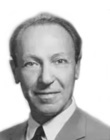Friedrich A. von Hayek (1899 - 1992)

Nobody can be a great economist who is only an economist – and I am even tempted to add that the economist who is only an economist is likely to become a nuisance if not a positive danger
Nobel Laureate F.A. von Hayek was one of the most seminal social philosophers of our time and a leading representative of the Austrian School of Economics. His approach to economic and social phenomena is distinguished by his methodological individualism and subjectivism. Hayek’s analysis, therefore rests upon the insight that every individual chooses and acts in pursuit of his/her purposes and in accordance with the perception of his/her options for achieving them.
His pathbreaking thoughts exposed the inherent theoretical flaws of socialism and stripped it from its political and cultural pretense. Hayek’s theories on business cycles, the division of knowledge, on competition and spontaneous social orders not only provided new seminal insights in the workings of a society of free people. Numerous of his books also became milestones in the literature of economic theory and social philosophy. His Denationalization of Money or his proposals for a reform of democratic systems are judged revolutionary.
The Essence of Hayek (K.R.Leube/Chiaki Nishiyama ed.; Stanford University 1984) is still considered the best collection of F.A. v. Hayek’s most important and influential works.
I
Born in 1899 in Fin-de-Siecle Vienna, Friedrich A. von Hayek grew up in a family that could lay claim to an academic tradition of well over three generations. To avoid his embarrassing failings in several schools in Vienna, he voluntarily joined the Austro-Hungarian Army in March 1917 and served as an artillery officer at the Italian Piave front. The truce of Nov. 3, 1918 brought WW I to an end. Without any binding command or order, Hayek and tens of thousands other exhausted, unruly and hungry troops began their treacherous march back into the chaos of the disintegrating Austro-Hungarian Empire. The breakdown of the monarchy’s venerable social and political institutions suddenly reduced the huge Empire to a deeply divided, small and land-locked country of barely seven million. Hayek’s own society vanished before his very eyes and left him disillusioned and clueless.
And yet, despite the desperate situation in starving Vienna, Hayek enrolled in the University there, obtained his Law degree in 1921 and his second doctoral degree in Political Science in 1923. During his studies he started to work under Ludwig von Mises’ directorship in the office for pre-war debts settlements. Mises (1881-1973), the most eminent scholar of the 3rd generation of the Austrian School of Economics, became Hayek’s mentor and conducted his famous private seminar between 1921-1934 outside the university. The ‘Mises Seminar’ turned out to be the nucleus of the 4th generation of the Austrian School. It is remarkable that far more than half of the seminar participants later became world-famous in their respective academic fields. However, with the Nazi terror and a despicable antisemitism on the rise and almost no prospects of ever gaining access to an adequate academic position, all but a very few of these uniquely talented scholars left Austria for good. Schumpeter and Hayek were the first, many others were soon to follow. This “brain drain” lead to devastating consequences in the intellectual life in Austria and Germany.
II
Hayek’s first book Monetary Theory and the Trade Cycle (1929) at once set a standard in modern business cycle theory that still is valid. One of the most striking characteristics is Hayek’s insight that any shortage of capital immediately causes a crisis. While classical economic theory never elucidated what causes such a shortage, Hayek made it clear that any overinvestment leads to scarcity of capital, unavoidably compelling a decline in investment and hence leading to the loss of a part of the real capital, produced because of the excessive investment rate. In his second book Prices and Production he refined his theory further.
Invited by Lord Robins, Hayek’s lectures at the London School of Economics proved so successful that he was offered a professorship almost immediately thereafter. At this time, when John Maynard Keynes’ new theories began to dominate academic and political life Hayek was directly drawn into a fundamental debate with Keynes. Hayek opposed his theories vigorously and thus became the leading intellectual force against Keynes and his followers. However, the aftermath of the Great Depression with huge unemployment rates and the threatening harbingers of WW II proved to be a fertile ground for the politically attractive “Keynesian Revolution”, with its easy ‘solutions’ and massive government interventions. Hayek’s approach of waiting out the crisis was politically sidelined.
While being deeply involved in these heated debates, Hayek at the same time opened yet another intellectual front and published his three eminent essays which forever shattered the foundations of socialism. He collected them in his Individualism and Economic Order (1948). The painful collapse of socialism as a viable political system in 1989 is the empirical proof of Hayek’s and Mises’ insights. Hayek’s interest in technical economics culminated in his The Pure Theory of Capital (1942) which is one of the most penetrating books ever published in this complex field.
III
But his intensive work on the insoluble economic and moral problems of socialism, the terror of fascism, and the outbreak of World War II made him write his most famous book The Road to Serfdom (1944). A best-seller of the immediate post war years, translated into some 25 languages was a revelation for those who wanted freedom. Hayek exposed there the ideological links between socialism and fascism and demonstrated that no variety of socialism, no matter what its name or however modified by trendy adjectives, carries with it any adequate provisions for the preservation of economic, political and individual freedom. Thus, the popular view of the convergence of economic systems, often called ‘The Third Way’ is based on pure economic error and is a pretense of knowledge.
Hayek devoted his next subject on methodological problems. His book The Counter-Revolution of Science (1952) contains probably the most effective refutation of the popular superstition that the methods of the natural sciences can be applied to and utilized for the explanation of social phenomena and human action. This important book is key to the understanding of his work. His seminal essay “The Use of Knowledge in Society” (1945) contains the quintessential argument against socialism. The independent interaction of millions of individuals, each possessing only bits and pieces of information of which beneficial use might be made, creates circumstances that cannot be conveyed to any central authority. He shows how such unorganized knowledge of the particular circumstances of time and place spontaneously can bring about a social order. The price system thus is the only mechanism that communicates the information which enables us to adapt to circumstances of which we know little. Our whole modern social order and well-being thus rests on the possibility of adapting to processes that we do not properly know. In April 1947, Hayek founded the exclusive ‘Mont Pelerin Society’, an international association of classical liberal scholars.
IV
By the end of 1949, Hayek left the London School of Economics, spent the spring term of 1950 in Fayetteville (AR) before he joined the University of Chicago for the next 12 years. Among his colleagues there were M. Friedman (Nobel Prize 1976), G. Stigler (Nobel Prize 1989), R. Coase (Nobel Prize 1991), or G. Becker (Nobel Prize 1992). Although Hayek was again very prolific, only two books can be mentioned here. The Sensory Order (1952) is his least known work but contains the philosophical and psychological origins of his thinking. Hayek developed the decisive yet preliminary thoughts for this discourse in theoretical psychology during his risky march back from the Italian front and in the early 1920s when he was inspired by the works of Moritz Schlick and his distant cousin, Ludwig Wittgenstein. The second book is his classic The Constitution of Liberty (1960), one of the great scholarly books of our time. Here Hayek further refined his idea of a spontaneous social order, and laid down the ethical, legal and economic principles of individual freedom and free markets. While most contemporary social philosophers chiefly aim for the construction of ideal forms of societies through autocratic plans, Hayek’s main task is the finding of rules that enable men with different value convictions to live together and bring about a smoothly functioning social order. These rules of proper conduct develop naturally through the voluntary interactions of individuals, each following her or his own ideas or needs. These rules neither imply that people are following any commands laid down, nor even that individuals realize they act in a certain way by obeying them. Rather, they indicate that the behavior of individuals follows certain discoverable principles. In other words, for Hayek all social orders are the result of human action but not of a conscious design.
V
In 1962 Hayek returned to Europe and joined the University of Freiburg/Breisgau. Among the many works, which he published there, again only two can be mentioned. His Studies in Philosophy, Politics and Economics (1967) cover Hayek’s works dating from the early 1950s to the mid-1960s. This book contains among other important essays, the classics, “The Intellectuals and Socialism” and “The Results of Human Action but not of Human Design”. His book Freiburger Studien (1969) is a collection of important German essays, including his “Competition as a Discovery Procedure” and “Kinds of Order in Society”.
After becoming professor emeritus in Freiburg in 1968, he accepted a professorship at the University of Salzburg (Austria) and shortly thereafter he published the 1. volume of his trilogy Law, Legislation, and Liberty. In this book he refines his distinction between a spontaneous social order and a man-made organization by showing that the distinctiveness is closely related to the two different kinds of rules that prevail in them. For Hayek there are end rules that are purposefully set to achieve a specific end (for example the tax code or welfare state) and process rules that allow people to act (for example the rules of a game). The second volume is devoted to the misleading yet omnipresent political term “Social Justice”. For Hayek, this narcotic phrase makes sense only in an organization where strict distributive rules apply, but cannot be used as a measure for income distribution in the spontaneous order of free societies.
Very much to his surprise he was awarded the Nobel Prize in Economics in 1974, however for thinly veiled political reasons he had to share the Prize with Gunnar Myrdal, the intellectual force behind the socialist model of Sweden. In his Nobel lecture on “The Pretense of Knowledge” (1974) Hayek powerfully refuted once again the erroneous assumption of the Keynesian superstitions.
At the age of 78, he moved back to Freiburg and continued to lecture, write and travel extensively until the mid 1980s. In 1977 completed his third volume of his trilogy Law, Legislation, and Liberty and as a side product, he published his revolutionary Denationalization of Money. According to Hayek, inflation can be avoided only if the monopolistic power of issuing money is taken away from government and/or state authorities, and private industry be given the task of promoting competition in currencies. Regretfully due to his advanced age he could not complete his last book in which he hoped to restate his theory of cultural evolution and expose once more the errors of constructivism. Sadly The Fatal Conceit has been severely edited and thus his last work is not his best.
Hayek’s work arose and developed from a comprehensive approach to various disciplines that condition and influence one another. His publication list contains well over 40 books and some 300 scholarly essays and articles. As a scholar, a teacher, and a patient fatherly friend, Friedrich August von Hayek came as close to the vanishing ideal of a gentleman as perhaps human frailty will ever permit. He died in Freiburg/Br. on March 23, 1992.
Kurt R. Leube





































